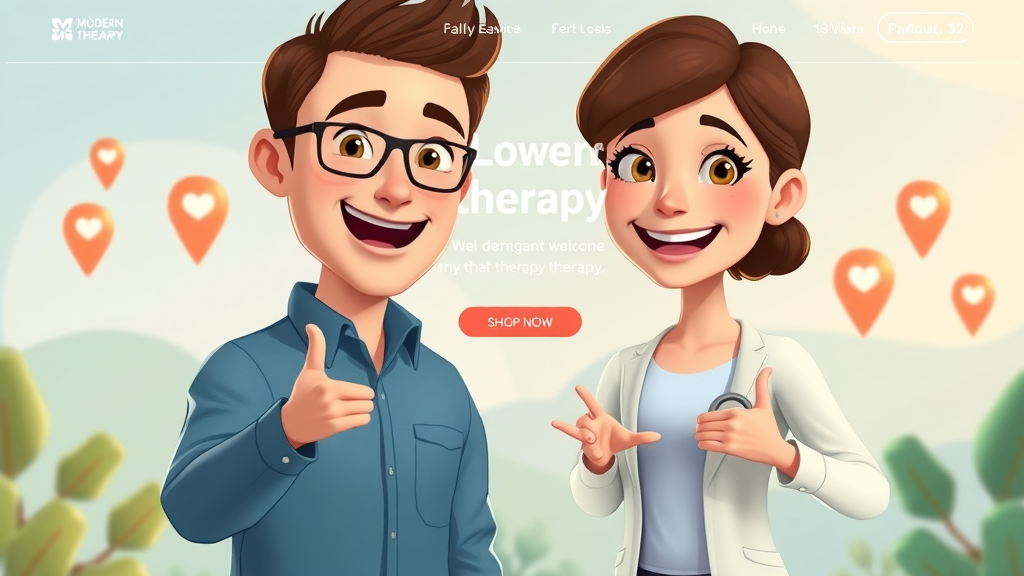- Last year, over 78% of therapists reported that new digital marketing methods doubled their client acquisition – but few know which strategies actually deliver sustainable growth. In this guide, you’ll learn what is the best marketing for therapists in 2025? and how to future-proof your therapy practice.
Understanding What Is the Best Marketing for Therapists in 2025? – Latest Trends & Examples
- Overview of marketing shifts in therapy practices for 2025

- Practical examples: innovative digital marketing and social media methods for therapists
- Highlighting marketing strategies for therapists that attract ideal clients
The marketing for therapists landscape is rapidly evolving as we head into 2025. With traditional advertising becoming less effective, digital marketing strategies now dominate how therapy practices reach their ideal clients . More practices are pivoting towards building robust online presences , leveraging social media platforms, and producing engaging content that resonates with both current and potential clients . For example, therapists are creating impactful blog posts and resource guides on mental health topics, positioning themselves as trusted authorities within their niche.
One standout trend is the integration of cutting-edge technology—think chatbots for first-contact queries and AI-driven assessment tools to streamline intake. These tools compliment highly visual social media campaigns, such as Instagram Reels that break down complex mental health issues into digestible clips or carousel posts showing bite-sized self-care routines. Innovative therapies are also running targeted Google Ads campaigns that zero in on local communities or specific client demographics, seeing conversion rates rise as result. Ultimately, the best marketing for therapists in 2025 combines data-driven insights with authentic storytelling to attract, retain, and empower clients.
These modern marketing strategies are not just about attracting a wider audience ; they’re about connecting with the right people—those who most need your services. As more mental health professionals recognize the power of these digital tools, competition will increase, making it essential to not only learn but implement the right approaches as soon as possible.
How Social Media and Digital Marketing Revolutionize Marketing for Therapists in 2025
- Maximizing social media for mental health professionals: Key platforms and content strategies

- Latest digital marketing trends tailored to therapy practices
- Case study: Real therapist success with marketing strategies for therapists
Social media is at the core of marketing for therapists in 2025. Platforms like Instagram, TikTok, and LinkedIn are increasingly important for mental health professionals seeking to both inform and engage their ideal clients . Instagram Stories enable therapists to take followers through a “day in the life,” while TikTok videos serve to de-stigmatize mental health in playful yet educational ways. LinkedIn, on the other hand, helps build referral relationships and foster a professional network with other health professionals or practice owners.
Therapy practices are using social media not only to share valuable content but to showcase their brand personality . For example, video testimonials highlight recovery journeys (with client consent), while Q&A sessions via live streams address common mental health concerns. A case in point: One group practice introduced a monthly series on Instagram Live, answering followers’ mental health questions and seeing a 35% uptick in new client inquiries within three months. These tactics establish credibility, foster trust, and create a loyal following—key ingredients for any effective marketing strategy today.
Alongside social content, targeted digital marketing efforts such as retargeted Facebook ads and Google ads campaigns ensure your practice appears when potential clients are searching for help. Analytics from these campaigns inform you which content resonates most, allowing refinement and optimization that continues to deliver better returns over time. By blending these marketing strategies for therapists , you can transform your outreach and sustainably grow your practice.
Building an Online Presence: Content Marketing and Local SEO for Therapists
- Why an online presence matters for the best marketing for therapists in 2025?

- Optimizing your website and therapy practice listings with local SEO
- Content marketing: Crafting impactful blog posts and mental health resources
- Email marketing: Building client relationships and authority
Establishing a powerful online presence is indispensable for any therapy practice wishing to thrive in 2025. Today’s clients often turn to search engines to find mental health support near them. If your therapy practice doesn’t appear in their initial search, you lose a significant portion of potential clients . That’s why optimizing your website and practice listings with local SEO is a non-negotiable strategy.
Local SEO ensures that when someone searches for “therapist near me” or “anxiety counseling in [your city],” your site appears front and center. This is achieved by creating well-structured web pages, leveraging Google My Business profiles, and encouraging clients to leave authentic, positive reviews. Equally vital is regular content creation. Publishing a weekly blog post on relevant topics, such as coping with workplace stress or managing family dynamics, not only attracts organic traffic but builds trust and establishes your authority as a mental health expert.
Email marketing further fortifies the relationship between your practice and your audience. Sending regular newsletters featuring new blog posts , upcoming events, or wellness tips positions you as a consistent, supportive presence in clients’ inboxes. This consistency builds rapport and encourages repeat engagement, which is invaluable for client retention and referrals. In combination, these strategies help you stand out, reach your ideal clients , and grow your practice faster.
Identifying and Reaching Your Ideal Client: Strategies for Therapists in a Digital Age
- Defining your ideal clients for targeted marketing

- Leveraging search engine and google ads for therapy practice growth
- Strategies for therapists: Personal branding, community engagement, and referrals
- Best platforms for health professionals to connect with new clients
| Marketing Channel | Reach | Cost | ROI Potential (1-10) | Best Use Case |
|---|---|---|---|---|
| Social Media (Instagram/TikTok) | Wider audience, younger demographics | Low-Medium | 9 | Brand awareness, engagement, education |
| Google Ads/Search Engine Ads | High-intent local searchers | Medium-High | 8 | Immediate client acquisition |
| Content Marketing (Blog Posts/SEO) | Global, evergreen reach | Low | 10 | Authority building, organic discovery |
| Email Marketing | Existing/past clients | Low | 7 | Retention, referrals, updates |
| Community Engagement/Referrals | Local/professional circles | Low | 8 | Direct trust, high conversion |
To truly succeed, therapists must clearly define their ideal client profile: age, needs, common search terms, and interests. This ensures your marketing strategies for therapists are targeted and efficient, rather than casting a wide, unfocused net. By leveraging analytics from both your website and social media , you can see which demographics engage most with your content and refine messaging accordingly.
Search engine marketing and paid Google ads empower you to reach the right people at the decisive moment—when they are actively searching for help. Smart use of keywords, compelling ad copy, and direct calls to action deliver measurable client growth. Personal branding (sharing your story and expertise through blogs, podcasts, and interviews), along with visible engagement in community forums or local events, deepens trust and encourages word-of-mouth referrals.
Beyond paid channels, the best platforms for health professionals to connect with new clients include Psychology Today, TherapyDen, and even telehealth platforms with built-in discovery features. When combined with consistent, valuable content and engaged communication, these approaches ensure you’re not just seen—you’re remembered and chosen by your most ideal clients .
Crafting a Comprehensive Digital Marketing Strategy for Therapy Practices
- Step-by-step guide to building a sustainable marketing strategy for therapists

- Scheduling, automation, and measuring digital marketing impact
- Balancing online presence with ethical guidelines for mental health professionals
- Tips for practice owners to grow your practice in a competitive landscape
“In 2025, successful therapists are those who invest in consistent digital marketing and authentic online engagement.” – Leading Industry Expert
If you want to grow your practice in 2025, you need a digital marketing strategy that is both dynamic and trackable. Start with a clear definition of your objectives: Is your goal to acquire 20 new clients per month or to build greater brand awareness within your specialty? Break down the process: Develop a client-centric website, create detailed content marketing plans, set up automated social media posts, and establish a system for regular email campaigns.
Tools like Hootsuite, Mailchimp, and Google Analytics help you streamline scheduling and track performance. Automated follow-up emails and chatbots offer support to potential clients even when you’re away, ensuring you don’t miss opportunities. Importantly, always measure the impact of your efforts—use KPIs such as website traffic, conversion rates, and client acquisition costs to see what’s working and adjust as necessary. This data-driven cycle keeps your marketing strategy effective and efficient.
Balance is also crucial: Ethical guidelines, especially for mental health professionals , dictate boundaries in content and client outreach. Never compromise client privacy for clicks, and focus on creating value rather than chasing trends. As a practice owner, staying informed, investing in ongoing education, and fostering genuine connections with your audience are the final steps to ensuring lasting success.
Innovative Marketing Strategies for Therapists: What’s Working in 2025?
- Emerging trends: Telehealth, influencer partnerships, and video marketing
- Special campaigns for therapy practice brand recognition

- Utilizing review platforms and testimonials to boost social proof
2025 has seen several fresh approaches come to the fore for marketing for therapists . The explosion of telehealth means your practice can now reach clients miles away. By incorporating teletherapy into your offerings—and marketing this capability through Google My Business, your website, and telehealth-specific directories—practice owners now attract not just local, but also remote potential clients .
Influencer partnerships (such as collaborating with wellness bloggers or mental health advocates on Instagram or TikTok) offer a shortcut to credibility and reach a wider audience . Video marketing, such as recording welcoming messages, walk-throughs of the therapy process, or explainer clips on handling anxiety, puts a real face to your brand and builds trust. Special campaigns, like virtual open houses or timed workshops, create urgency and drive engagement.
Leveraging reputable review platforms and requesting testimonials from satisfied clients (with permission) dramatically strengthens your social proof . Platforms like Google, Healthgrades, and Psychology Today all play a role in boosting your online reputation. Word travels faster than ever, and potential clients are more likely to book with a therapist who has clear, genuine endorsements from past clients.
Which Is the Best Marketing Idea in 2025?
- Analysis of top marketing ideas for therapists in 2025 and how they outperform traditional strategies

- Integrating several digital marketing tactics for maximum impact
The best marketing idea in 2025 is the integration of several digital marketing tactics —from local SEO and blog post campaigns to targeted ads and regular email marketing . These methods far outpace traditional strategies like print ads, flyers, or generic business directories when it comes to attracting ideal clients , building lasting relationships, and scaling therapy practices. Not only are they more measurable and cost-effective, but they also provide insights you can use to optimize performance and iterate quickly.
For instance, combining blog content (optimized for common client search terms) with regular social media posting and follow-up through email creates a client journey that feels personalized and supportive from start to finish. When you supplement this with retargeting ads and voice-of-the-client testimonials, the impact multiplies.
Ultimately, what separates thriving practices from stagnant ones is the willingness to test, refine, and combine multiple approaches to reach and convert the most relevant audience. Online and offline touchpoints both play a role, but the digital landscape is where real momentum is found in 2025.
What Is the Best Marketing for Therapists?
- Summary of core strategies for therapists and why certain methods work best now
- Adapting the lessons learned from 2024 and before
The best marketing for therapists in 2025 comprises a blend of content-rich websites, active social media, search engine visibility, and ongoing relationship-building through email and reviews. The most successful therapy practices are those that quickly adapt to changing digital trends while remaining true to ethical standards and personal values.
Learning from 2024, therapists have realized the immense value in nurturing long-term engagement, not just chasing leads. This approach fosters trust, builds authority, and encourages referrals, making your marketing strategies for therapists work even when you’re not actively promoting your services.
By staying informed, continual optimization, and harnessing a variety of digital tools, therapists can secure their place as the first choice for those seeking mental health support in their community and beyond.
What Is the Future of Marketing in 2025?
- Predictions for digital marketing in therapy and mental health industries
- Technological changes therapists must prepare for

As we look ahead, the future of marketing for therapists will be even more reliant on technology, personalization, and authenticity. Predictive analytics and AI-driven insights will further refine audience targeting, allowing therapists to tailor content according to their ideal clients’ needs and behaviors.
Expect to see more integration of virtual reality (VR) and augmented reality (AR) as tools for mental health promotion and client education. Automation will handle routine admin, freeing therapists to focus more on client relationships. Data privacy and ethical marketing will be hot button issues, demanding transparent policies and client communication at every turn.
Adapting quickly to emerging technologies—while prioritizing compassion and genuine connection—will remain at the heart of effective digital marketing for therapists.
What Is the 2 Year Rule for Therapists?
- Explanation of the 2 year rule and its impact on therapist marketing strategies

- How to plan long-term for a thriving therapy practice
The 2 year rule in therapy refers to the expectation that building a strong, sustainable practice typically takes at least two years of consistent, focused effort. For marketing, this rule underscores the importance of persistence and long-term planning: results don’t appear overnight, but accumulate and compound over time.
Therapists must commit to continuous marketing—across social media , content, and community events—for at least two years before expecting to see major shifts in client load and reputation. Regularly reviewing and adjusting strategies is crucial for hitting growth milestones.
Planning for the long-term means setting clear goals, tracking progress, and remaining adaptable as the digital landscape changes. Over time, the compounding effect of good marketing strategies for therapists translates into a thriving, resilient practice.
Checklist: Marketing Strategies for Therapists to Grow Your Practice in 2025
- Essential steps: online presence, content marketing, local seo, social media, email marketing
- Ongoing tasks for practice owners and mental health professionals
Ready to level up your marketing for therapists? Here’s a quick checklist for 2025:
- Optimize your website for local SEO – keep information accurate and up to date
- Develop a content plan – schedule at least two blog posts per month
- Be active on two key social media platforms
- Set up Google Ads to target city or specialty keywords
- Create an email marketing sequence for leads and existing clients
- Request testimonials and update them regularly
- Review analytics monthly to adjust marketing strategies
- Participate in one community event or digital partnership each quarter
Use this as your roadmap to grow your practice —and check off each task to stay ahead of the curve!
Answering Your Marketing for Therapists FAQs
- What’s the most effective social media platform for therapists?
- How do I measure the ROI of my digital marketing as a therapy practice owner?
- Are there ethical considerations for marketing strategies for therapists?
- What budget is realistic for therapists new to digital marketing?

What’s the most effective social media platform for therapists?
Instagram is currently the most effective platform due to its visual format and high engagement rates among adults seeking mental health content. However, TikTok has rapidly grown, especially for younger demographics. Choose the platform that best matches your ideal client’s habits and comfort level with sharing.
How do I measure the ROI of my digital marketing as a therapy practice owner?
Track metrics like website visits, new client inquiries, booked appointments, and email open rates monthly. Calculating ROI involves comparing the cost of your marketing efforts to revenue brought in by new clients sourced through those channels. Consistently review analytics and adjust strategies based on performance.
Are there ethical considerations for marketing strategies for therapists?
Absolutely. Therapists must follow advertising guidelines set by licensing boards, ensure client privacy is protected, and avoid making misleading claims. Always prioritize professionalism and empathy in all external communications, and refrain from soliciting reviews from current clients in ways that could compromise ethical boundaries.
What budget is realistic for therapists new to digital marketing?
Starting with $200–$500 per month is reasonable for solo therapists or small practices. This can be allotted to affordable website hosting, design, social media ads, and content marketing tools. As your practice grows , invest more in strategic paid ads and professional content creation.
Key Takeaways: What Is the Best Marketing for Therapists in 2025?
- Summarizing actionable steps for leveraging the best marketing for therapists
- How to combine digital marketing, content marketing, and ideal client targeting for practice growth
- Final thoughts for mental health professionals wishing to thrive in 2025
To succeed in 2025: Invest in a dynamic online presence, use social and content marketing to build trust, and precisely target your ideal clients through SEO and ads. Prioritize continuous learning, ethical engagement, and responsiveness to technology shifts. Combining these core elements guarantees sustained therapy practice growth and community impact.
Ready to Grow Your Therapy Practice?
- Discover The Biggest & Best Traffic Source For Your Business. This Works For Amazon, Walmart, Ebay & 1000s of Local Businesses… And Will Work For You Too! https://theamplificator.clientcabin.com/app/info
 Add Row
Add Row  Add
Add 


Write A Comment